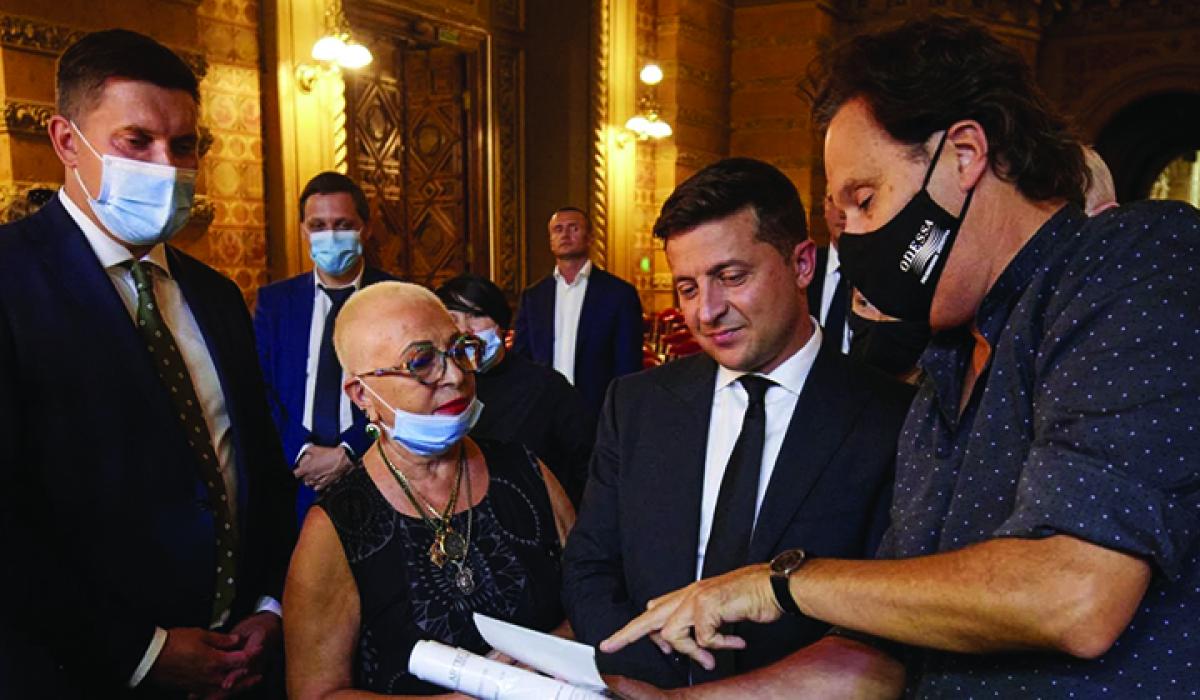On the evening of Feb. 12, Hobart Earle ’83, the longtime director of the Odessa Philharmonic Orchestra, ended its concert with a surprise encore, the overture to Mykola Lysenko’s opera, Taras Bulba. It is considered Ukraine’s unofficial national anthem and with rumors of a Russian invasion mounting by the day, Earle decided to add it to the concert just the night before. “I know my audience and my musicians,” he says. “I know that they are patriotic and that they needed something to lift their spirits. And it certainly did.”
Earle and the orchestra received a raucous, two-minute standing ovation that night. A few days later, he and his wife left Odessa, with guest conductors scheduled to lead the orchestra’s concerts until his planned return in mid-March. Now, when — or whether — he will return to Ukraine, and what he will find there if he does, are unknowable.
As of March 8, it was still possible for Earle to communicate with loved ones back home, but the news has been grim. His assistant made it safely to Moldova on her way to Bulgaria, where Earle was able to find her accommodations, “since Chisinau [the Moldovan capital] is way overcrowded with refugees.” Earle’s 79-year-old mother-in-law was burning firewood for heat after rocket attacks destroyed her town’s gas works. His brother-in-law, who lives outside of Kherson, said Russians had cut off Ukrainian television stations and replaced them with Russian government stations (which “broadcast alternative reality,” Earle snaps). In the United States visiting their son, Earle and his wife also remain glued to the TV.
The philharmonic, meanwhile, canceled all concerts after the invasion, including some that would have featured Greek music to celebrate the 200th anniversary of the Greek War of Independence. That war, like the battle for Ukraine, also captured the world’s imagination, drawing people from around the globe, including English poet Lord Byron, to join the fight for freedom.
In a sense, Earle and many in Ukraine have seen this coming for some time. In 2014, the day after the Russian annexation of Crimea, he and scores of musicians and singers formed a flash mob in the Odessa fish market to play Beethoven’s iconic “Ode to Joy,” the anthem of the European Union, to startled but appreciative onlookers.
“The idea was to bring the music — and bring this uniting spirit — to the people,” he told PAW at the time. Earle hopes he might be able to do something in a similar spirit now, perhaps conducting concerts to aid Ukrainian relief efforts. “I have my tails with me,” he says.
Except for those tails and the rest of what he packed into a single suitcase, however, everything Earle owns remains behind in Odessa. He is particularly concerned about his career’s worth of musical scores and hand-notated orchestral parts, which are irreplaceable. Earle has lived in Odessa since 1991, the year the Soviet Union fell, and considers Ukraine his home. “I’ve seen that country’s independence from day one,” he says. Though he is esteemed in Russia, as well — in 2003, the Russian Cosmonaut Association even named a star for him in the Perseus constellation — Earle bitterly rebuts Russian talking points used to justify the invasion. “This is not about language or ethnicity,” he insists. “This is about the independence of Ukraine.”
On March 1, Earle reposted a photograph of the street outside the Odessa opera house, his professional home for three decades, protected by sandbags and anti-tank obstacles. “This is 2022, not 1941!!” he exclaimed in a caption.
There are no answers, only questions. “You feel helpless that these people you spent 30 years of your life with are facing the abyss,” he says. Several members of the philharmonic have shepherded their families to the border and safety, then turned back themselves to join the resistance.
“These are simple musicians — my musicians — going to serve in the civil defense,” Earle says, his voice full of weariness and wonder. “But what else are they supposed to do?”
On Feb. 12 in Odessa, Earle led this surprise encore of the overture to Taras Bulba, an opera by the Ukrainian composer Mykola Lysenko.



